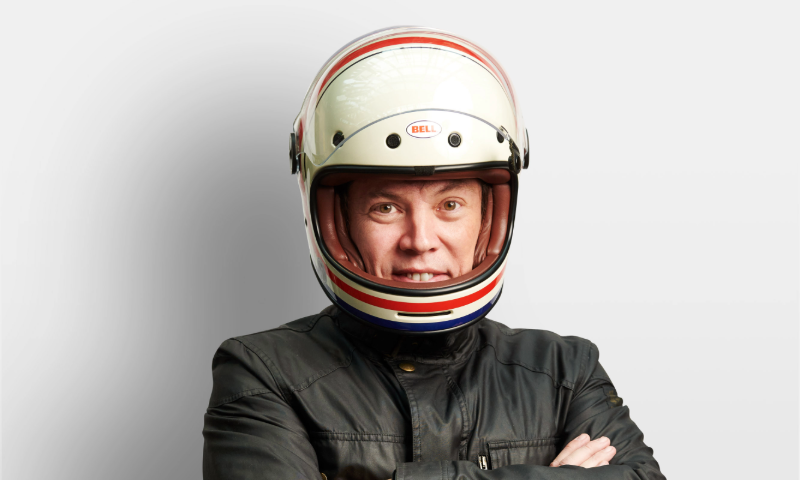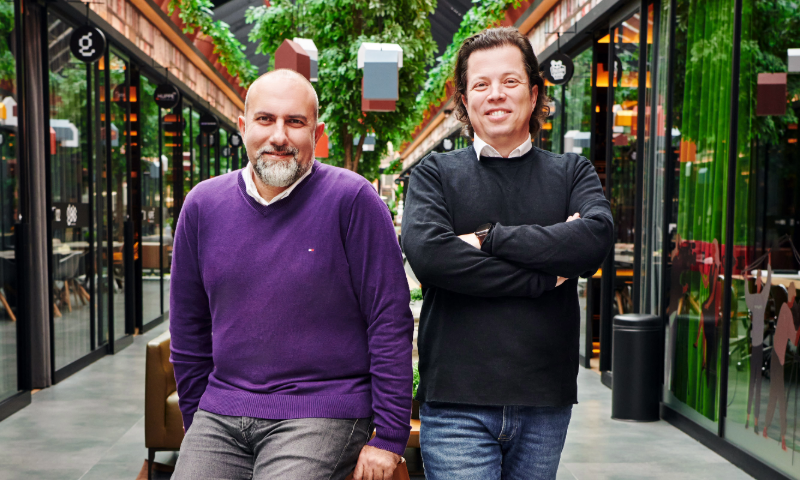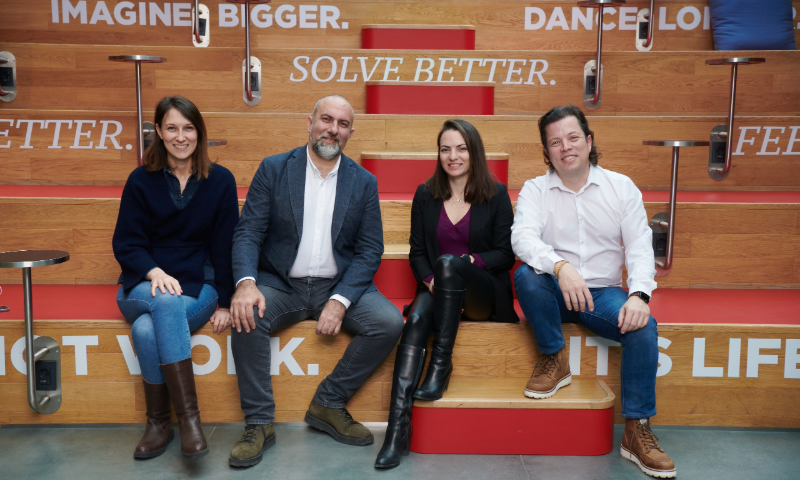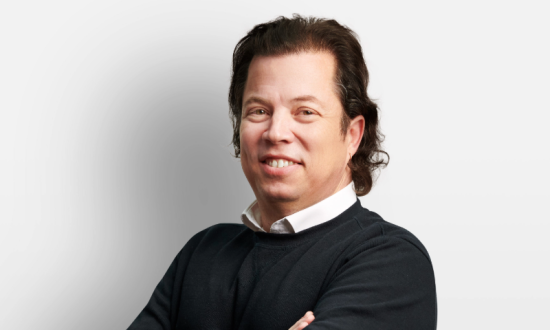Attila Algan is the co-founder and CEO of Cognitiwe, an innovative AI-driven company focused on transforming the retail industry by reducing waste and improving operational efficiency. With over 25 years of experience in the tech sector, Attila has held leadership roles at global companies like Nokia, Samsung, and TIM, where he honed his expertise in product development, business growth, and international market expansion. Passionate about technology and entrepreneurship, Attila is committed to driving sustainable solutions through AI. He is also a mentor to aspiring entrepreneurs and enjoys sharing his knowledge with the next generation of business leaders.
Recently, in an exclusive interview with Digital First Magazine, Attila shared his professional trajectory, the inspiration behind establishing Cognitiwe, his favorite quote, future plans, words of wisdom, and much more. The following excerpts are taken from the interview.
Hi Attila. Please share your background and areas of expertise.
While I hold a Bachelor’s degree in Electronic Engineering, my career has spanned international leadership roles in launching and managing brands, devices, and innovative solutions. I was fortunate to be part of the smart devices and consumer services boom, a pinnacle of innovation at the time. It was an incredible journey in a fast-paced, competitive environment, even in the market-making phase where educating customers was essential. This experience provided me with a deep understanding of how to bring innovation to market and the strategies needed to execute go-to-market (GTM) plans and scale rapidly in new and uncertain markets.
As CEO of Cognitiwe, this experience has been invaluable. It has shaped my ability to lead the company through the challenges of scaling AI solutions in the retail sector, where both innovation and market education are crucial. My background in navigating uncertain and evolving markets allows me to guide Cognitiwe in driving sustainability and profitability for our clients, ensuring we remain agile and competitive as we expand.
What inspired you to start Cognitiwe AI, and what problem are you trying to solve?
We came up with the idea for Cognitiwe towards the end of 2020, during the COVID pandemic. The global supply chain was in crisis, food shortages were widespread, and retailers saw profits turn into significant losses. Issues like food waste, especially in fresh produce, and out-of-stock items were prevalent. Even today, retailers face enormous losses from these challenges, with supermarkets discarding over 10% of their fresh produce annually.
This sparked the idea of using AI to tackle these problems, and Cognitiwe was born. We engaged with key players in the retail sector, and through discussions with prospective customers, we gained a deeper understanding of the need and how to effectively address it. Once we solidified our approach, the journey of Cognitiwe truly began.

What role do you see AI playing in driving business transformation in various industries?
AI will undoubtedly transform all aspects of our lives, including business methods and practices. It will play a pivotal role in driving business transformation by automating processes, enhancing decision-making, and unlocking new levels of efficiency and innovation. But let me clarify: it’s not AI alone that will transform everything—it’s the creativity of humans using AI that will lead this change.
In a few years, I doubt we’ll still be talking about AI as something new or groundbreaking. Like many past technological advancements, AI will become so ingrained in our lives that we’ll stop seeing it as separate from our daily activities. Think about the internet—no one talks about it anymore, it’s just there, as if it has always been. We don’t even highlight the business models it revolutionized. E-commerce isn’t “e-commerce” anymore; it’s simply commerce. We don’t think about CDs versus streaming; we just get our music from Spotify or similar platforms.
In short, AI will help us evolve, and soon, we won’t even think about it as something extraordinary. It will just be a part of how we live and work, seamlessly integrated into our everyday existence.
How do you balance the need for innovation with the need for explainability and transparency in AI decision-making?
Balancing innovation with the need for explainability and transparency in AI decision-making is crucial. On one hand, innovation often pushes the boundaries of what AI can do, allowing us to create smarter, more efficient systems. However, as AI takes on a more prominent role in decision-making, it’s essential that its processes are transparent and easily understood.
To achieve this balance, we focus on building AI systems that are not just powerful, but also interpretable. It’s important to design models that allow users to understand why certain decisions are being made. For instance, at Cognitiwe, we use AI to provide actionable insights for retailers, but we ensure that the reasoning behind these insights is clear, so stakeholders can trust the recommendations. This builds confidence in the system and helps users make informed decisions based on AI outputs.
Additionally, we prioritize ethical AI practices, ensuring that our algorithms don’t act as “black boxes.” This means regularly auditing our models, providing clear documentation, and maintaining open communication with users so they can understand how our systems work. The goal is to foster both innovation and trust by making AI both cutting-edge and transparent.

If you could have a one-hour meeting with someone famous who is alive, who would it be and why?
I would love to have a one-hour meeting with Bernard Arnault, the founder and CEO of LVMH. Having spent my entire career in technology, where the focus is often on volume, market share, repeat sales, and mass marketing, it would be fascinating to learn from someone whose approach is completely different. Arnault has built a business empire by prioritizing value over volume, individuality over mass appeal, and subtle, high-end marketing rather than loud, widespread campaigns. Understanding his mindset and approach to creating long-term value in luxury would be incredibly insightful and enriching for me.
How do you stay current with emerging trends and advancements in AI?
Staying current with emerging trends and advancements in AI requires a continuous, multifaceted approach. Networking with industry peers, participating in webinars, and staying active in AI communities are essential. I regularly engage with research papers, attend conferences, and follow leading AI organizations and academic institutions to remain informed about the latest developments. However, my personal engagement alone isn’t enough. At Cognitiwe, we’ve embedded this mindset into our company culture. We encourage our team to participate in academic research, explore new tools, and experiment with the latest technologies, ensuring we maintain a hands-on approach to learning. Collaborating with AI experts and related fields helps us stay informed and integrate cutting-edge advancements into our solutions, driving the continuous innovation at Cognitiwe.
Is there a particular person you are grateful for who helped get you to where you are?
There are many people I am grateful for who have helped me get to where I am today. I’m thankful to those who recognized my strengths and guided me in shaping my career path, and to my colleagues who stood by me through both challenges and successes. I am also deeply appreciative of those who supported me unconditionally.
Additionally, I am grateful to the difficult and overly competitive colleagues, incompetent leaders, and challenging customers—they, too, taught me valuable lessons in what not to do and how not to act. These experiences have been just as important in shaping who I am today.
And of course I am grateful to my co-founder Mete Bayran and the whole Cognitiwe team with whom we are writing our next success story.

What is your favorite quote?
“Everything is OK in the end; if it’s not OK, it’s not the end.” This quote has been attributed to various figures like Oscar Wilde, John Lennon, Fernando Sabino, and Paulo Coelho. While I’m unsure of its exact origin, I love the sense of perseverance and resilience it conveys. Scaling a startup and leading a team, especially in uncertain times like these, requires exactly that kind of steadfastness. It’s a reminder that challenges are temporary, and with persistence, things will ultimately fall into place.
Where do you see yourself in the next 5 years?
In the next 5 years, I see myself continuing to push new frontiers alongside my team at Cognitiwe. At the same time, I hope to give back by sharing what I’ve gained, both in terms of experience and financial success. I would love to mentor young business leaders and emerging startups, offering guidance and investing in innovative ideas where I can. It’s important to me to contribute to the next generation of entrepreneurs and help them succeed.
What advice would you give to aspiring AI leaders?
Aspiring AI leaders should focus on a few key areas to thrive in this constantly evolving field.
First, build a strong, diverse team. AI is rarely a solo endeavor, and fostering collaboration and a culture of curiosity can drive the best results.
Resilience is key. The AI landscape is filled with business difficulties, technical challenges and ethical dilemmas, and those who persist through setbacks are the ones who ultimately shape the future of AI.
Embrace lifelong learning—AI is always advancing, and staying current with the latest trends and developments is crucial. It’s not just about mastering technology but understanding the problem you’re solving, as the most successful AI solutions come from a deep grasp of real-world challenges.
Finally, balancing innovation with ethics is equally important. Leaders must ensure that their AI systems are not only groundbreaking but also transparent, trustworthy, and responsible.






